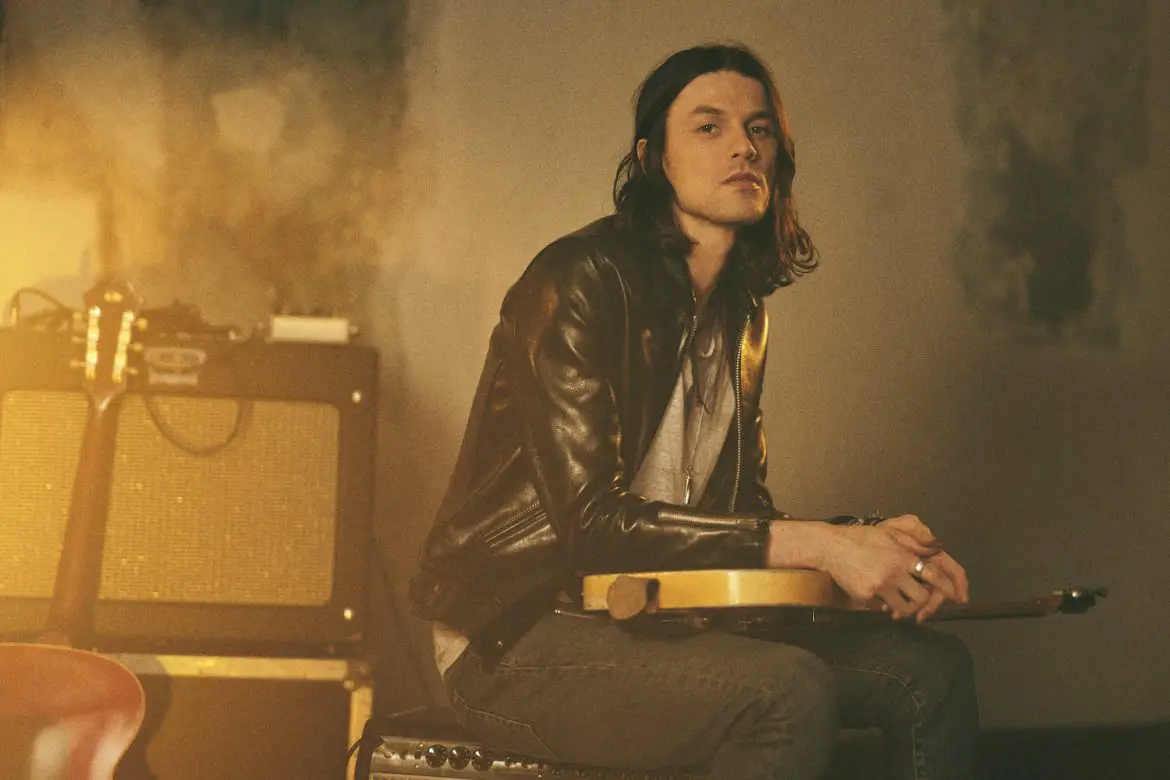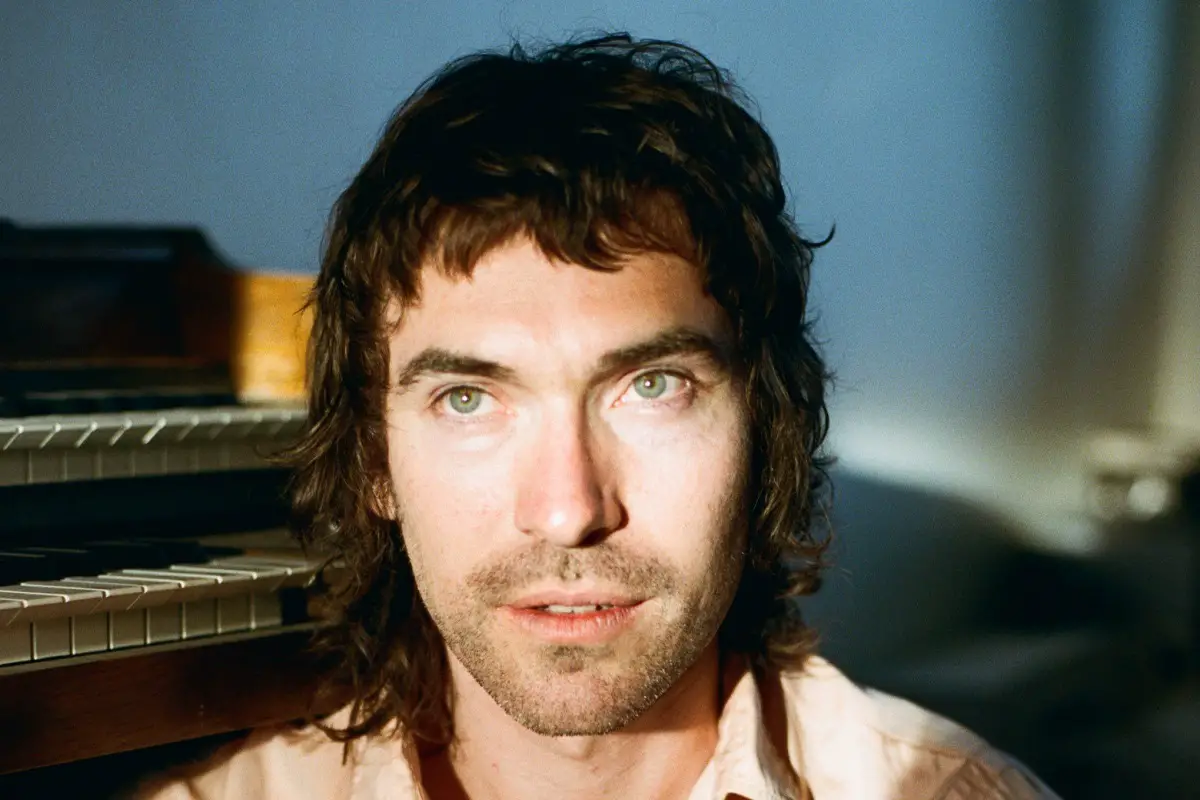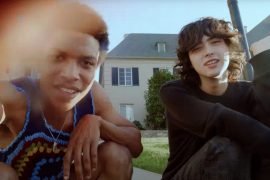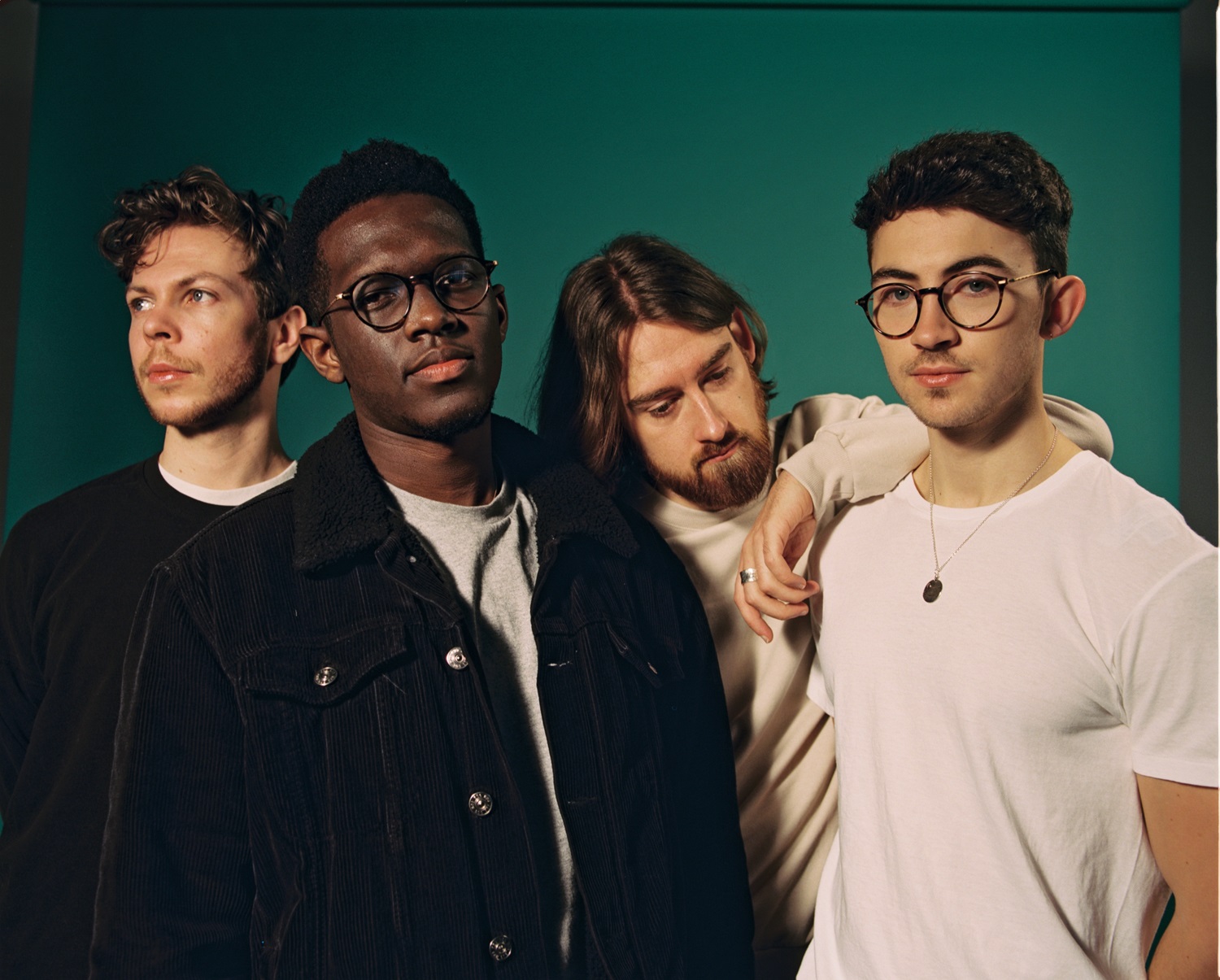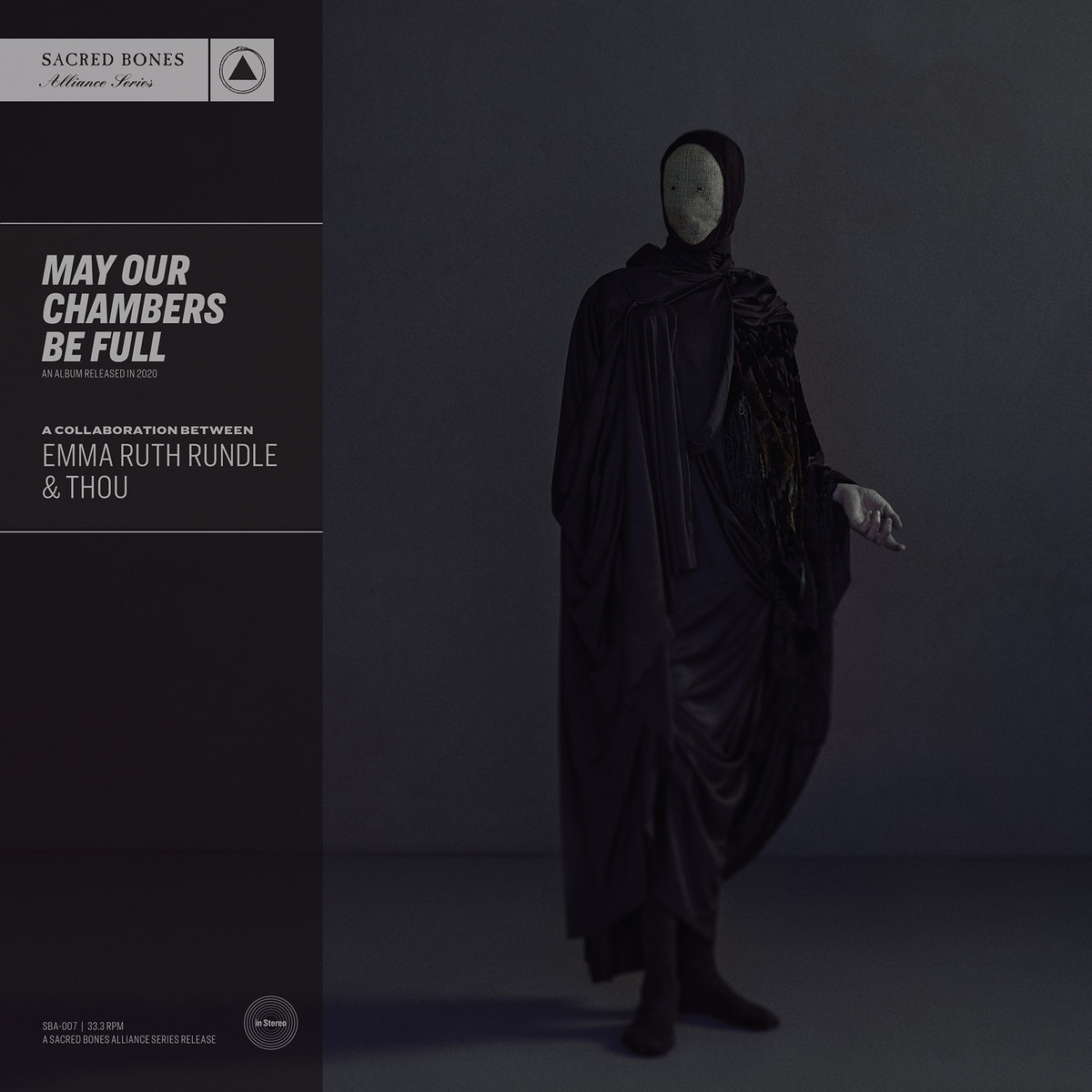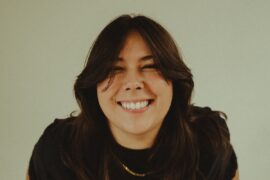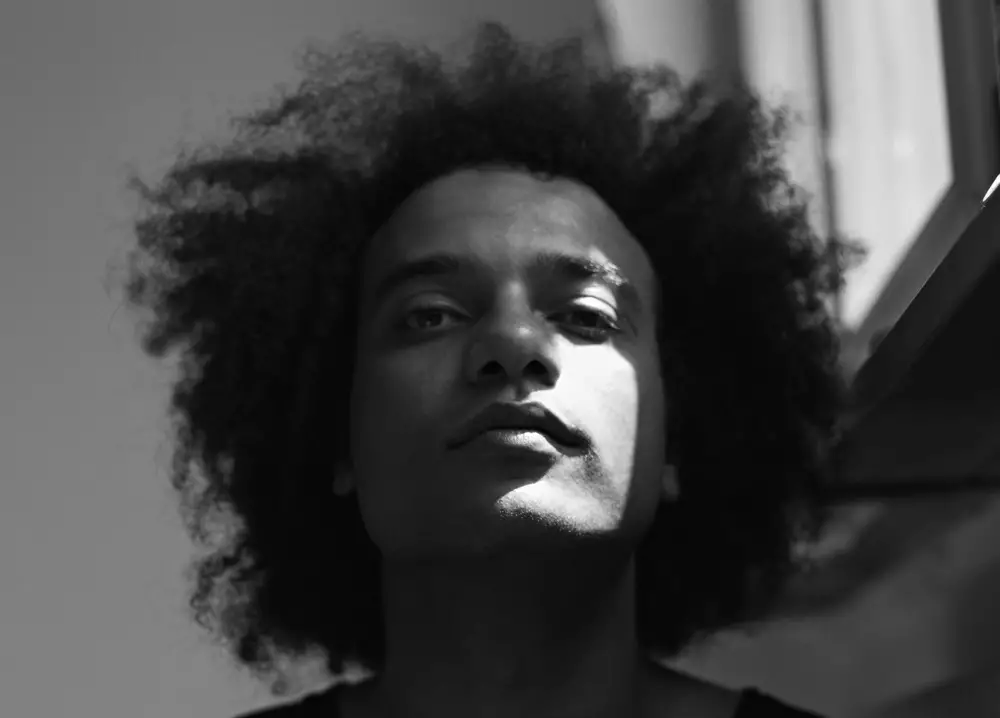Singer/songwriter James Bay opens up about his beautiful and vulnerable third album ‘Leap’ and shares some lessons of love in our in-depth interview about music, songwriting, and wearing our hearts on our sleeves in song.
Stream: ‘Leap’ – James Bay
I feel like for the first time ever I’ve been particularly vulnerable in my songwriting on this album.
James Bay is responsible for more than a dozen breathtakingly beautiful love songs over the past decade, and now he’s added about twelve more to that catalog. The acclaimed British singer/songwriter’s third studio album finds Bay at his most vulnerable and brutally honest, diving into his depths like never before and allowing the rawest parts of himself to shine through. Achingly emotional and sweetly moving, Leap is a soul-stirring outpouring of unbridled intimacy and radiant passion. I’m taking creative risks and pushing his own emotional boundaries, Bay has created his purest, most powerful, and fully realized album yet.

For every time you hate yourself
For all the ways you gave yoursеlf
When you can’t look in the mirror, heart’s rеady to spill
I just wanna tell you that you are brilliant still
For all the teardrops in your hands
For every time you wanted to dance
When you can’t look in the mirror, heart’s ready to spill
I just wanna tell you that you are brilliant still
– “Brilliant Still,” James Bay
Released July 8, 2022 via Virgin EMI and Republic Records, Leap is truly the work of an artist who has found his voice, as well as his calling: Making the world a brighter place, one song at a time. The follow-up to 2018’s acclaimed sophomore LP Electric Light – which spawned multiple global hits, including the worldwide smashes “Us” and “Wild Love” – is as emotionally charged as it is utterly enchanting.
Bay holds nothing back as he unveils his own fears and insecurities, explores the highs and lows of young love and lifelong romance, and rededicates himself to his partner and their newborn baby. From the cinematic expression of love and devotion in the album’s stunning opener “Give Me the Reason,” to the achingly tender warmth of songs like “Brilliant Still” and “Everybody Needs Someone,” to the somber, sobering lessons learned in “Save Your Love” and “Silent Love,” and the unbridled passion in standout single “One Life,” Leap is a compelling indulgence of love in its many beautiful and wondrous forms.
The album’s title is derived from a poem by American essayist John Burroughs: “Leap, and the net will appear.” This phrase became a daily mantra for Bay as he worked on this album: “A framework for attacking life in an era of perpetual uncertainty,” as he puts it.
“There’s a shift on this album towards optimism and hope,” Bay shares. “Albeit a pretty realistic, bullshit-free take on hope. But that’s the point: You can’t achieve anything without taking a gamble. You’ve got to leap.”
”But it’s optimism I feel when I think about Burroughs’ words. They lift me like the people I love in my life lift me. So, for the first time ever, I wrote from that emotion, writing songs that are total celebrations of the most important relationships in my life. I had never been that vulnerable before, because I was always trying to be the tough guy.”
Leap is dedicated to Bay’s daughter Ada, who was born last fall.
”It’s absolutely unreal,” Bay says of his baby girl, a twinkle in his smile. “It’s euphoric, it’s terrifying. It’s beautiful and brilliant. And it certainly has made me sort of sit up straight and pay attention to what’s going on, where I’m at in my life and my work and everything. It is gonna change things, but my drive is only more.”

For Bay, Leap is a personal and professional triumph. A big part of this album was opening up and being more vulnerable in his songs.
“I always want to be honest in my songwriting to myself about what I know I’m writing about, but I’ve never been very good at being vulnerable enough to talk in a little bit more detail about what the songs are about,” he explains. “Or in the case of this album, to just be able to write songs from a place of struggle that say, ‘Thank you. I love you. I need you. Thank you.’ The vulnerability that that takes, I have found to be one of the greatest obstacles making these songs… I’m still surprised that it feels okay that I’ve done it, but it does feel okay.“
Not only does he consider this to be his best work as a lyricist, vocalist, and songwriter – a notion this writer agrees with – but it also represents him besting his demons, and embracing vulnerability. Leap is also an artistic milestone, showcasing Bay’s expansive vocal range and depth, his charismatic guitar playing, and the spirited performance of his full band setup.
At its core, Leap serves as an irresistible reminder as to why we keep coming back to this talented British singer/songwriter. It’s inspiring and spirited, intimate and impassioned, energizing and galvanizing.
Bay feels the same way on the other side of the curtain, too.
“10 years into doing this professionally, that hunger hasn’t changed, and it hasn’t got any easier, either: It takes the exact same courage to do this today as it did on my first open mic night,” he admits. “So if I want to do this for the next 50 years – and I absolutely do, with all my heart – I’m going to have to hold on to that courage, and continue to take risks. Really, I have no choice but to leap.”
All the walls around you
They’re built to keep me in, they’re built to keep me out
All the nights we talked through
The stories we forgot, the treasures that we found
We’re friends and we’re enemies
You’re always forgiving me
So here’s to the misery
The change and the liberty
Oh, love don’t hate me
When I let you down
‘Cause all I ever think, all I ever think, all I ever think about
Oh but, love don’t hate me
When I let you down
You’re the only one I think, only I think, only one I think about, yeah

Perhaps we can best understand Leap as James Bay’s mission statement: His raison d’être.
To that end, Atwood Magazine caught up with James Bay to share some lessons of love, discuss songs old and new, and learn why he believes Leap is his most vulnerable, and meaningful, album yet. Dive into our interview below, and get lost in the breathtakingly beautiful world of Leap, out now!
I feel proud to have said what I’ve said in these songs; it makes me excited about what comes next. The boundary that I’ve pushed here more than ever is the lyric writing.
— —
:: stream/purchase Leap here ::
A CONVERSATION WITH JAMES BAY

Atwood Magazine: James to start off, I remember the very first time I heard the original version of “When We Were On Fire” as a student up in Boston. I can't tell you how many times I listened to The Dark of the Morning EP.
James Bay: Wow, man. Oh, wow. I got like, it’s weird to say, I got little chills there, but I really appreciate it. It’s… I do all sorts of interviews, and whether this is a surprise or not, people who’ve really sort of gone back and listened like that and been listening for a while, it’s not that common. So thank you, that’s really cool.
It's wild to think we're actually coming up on 10 years of that record. That was your very beginning and those tracks were just you and a guitar. There's something about those first couple of songs that I'll always cherish.
James Bay: I really appreciate that. I can’t really sort of tell you how much that’s… And, you know, through all of the journey so far, I’ve… My relationship with the experience of just playing with the guitar and my voice, it’s been a unique relationship. I’ve always known it it’ll sort of be there for me. I don’t wanna say I ever like fully abandoned it, but I think like a sort of moody teenager, there were times when I wanted to sort of step further away from it. And I wonder if I’ll have those times again. I don’t know, but I know that I now. And I know and I’ve known in the past how much I sort of love and cherish my sort of ability, I suppose, to be able to do that.
But I’m also trying to say that I like that there are versions of ourselves that we can go, no, I’m… You can almost fall out with them and go, I’ve kind of had enough of you for a while. I need to go and express myself in a different way and sort of wear a different version of myself. So, but no, I… Man, I appreciate that a lot.

Of course. And for what it's worth, I really enjoyed Electric Light. But before we talk about that, I wanted to ask about the creation of “When We Were On Fire,” because that has long been one of my favorite songs.
James Bay: Ma , I’ve never been asked so particularly about that song. And no one’s ever set up with I’ve been holding onto this question for 10 years as well, so I’m gonna try and give it my best. [laughter] here’s the first things that come to mind: This is about the making, about the song, but it’s really, this first sort of answer is about the making of the song. I, it’s so close to me and so sort of dear, to me, that song for so many reasons, not least because of the person I wrote it with, John Green. I’ve written with John so many times. We, John and I really are made sort of 98% of ‘Electric Light’ just the two of us together, but staying with “When We Were On Fire” and going back to that song. In 2011, I had met my managers who I’m still working with, who were brilliant, brilliant people.
And they, I really wanted to know about co-writing. I wrote on my own, I still write on my own, but I, so many are my favorite artists for writing with these other names who weren’t artists. And I wanted to know about that. So when I met these guys, they said, well, we can put you in touch with those kinds of people, professional songwriters, who do co-writing. And my manager had his close friend and neighbor who was also a manager, had just, they saw each other at a tube stop one morning, and they said, how are you getting on? And his friend said, I’ve just taken on this writer called John. And Paul, my manager said, I’ve just taken on this artist called James. Let’s put them together. And it was probably the third co-write I’d ever done. And it was the first song I’d ever written with John.
I walked into the room and I had the idea for the chorus. I had like the melody. I had a little bit of the beginning of the lyric of the chorus, but I had the melody landing over different chords. So, that, it’s such a pivotal moment “When We Were On Fire” for me in my whole kind of career. It’s the first in my mind… And I’m proud of the songs I wrote on my own before that song, but it felt like the first proper song I’d ever written, and he helped me shape it. And he was so inspired, John, in the moment as well. And that’s what, you know, I’ve gone on to sort of learn, the great songs come out of writing sessions when in the moment, or in hindsight, you recognize that the others in the room with you are just as like caught up in the moment.
And you know, so many times in so many different ways, in so many sort of different corners of my life, I am quite sensitive to sort of the struggle in any relationship. And I don’t just mean my own. I mean, maybe in a friend is having a difficult time or maybe I’m having a difficult time kind of getting along with a friend. So “When We Were On Fire” really encompasses how badly I’m always trying to hold a relationship together in the difficult moments. You know, take me back to where, where we were before, when we were on fire, which is the main sort of lyric, and then everything else in the song sort of follows that. And John, he understood that. He helped me with the fire lyric. I didn’t go into the session with that, but I went in with the kind of… I went in with, I know we are losing light. Our love is dying. Like a typical, like sensitive sort of sad guy. [chuckle] You know, sing a songwriter sort of thing. And that’s where I was at. So I went in with that and he really sort of went, okay, this is great. And it was quite finger picky and gentle, and he kind of put dun, dun, dun, dun, dun. He put that behind it and we were away. And I remember Lucy…
My girlfriend, we were going home on the train together. She was working in London at the time, and I’d done this session in London. And I met her on the train and she knows… She’d known I was doing all these co-writes and stuff. And she tells me to this day about this, the kind of glow that I had. And I showed her a little bit… I didn’t have a smart phone back then. I had a little Olympus dictaphone and I’d recorded some of the session, and I was only willing to show her a little piece because I was so excited and it wasn’t finished yet. I was going back in the next day to finish it. So I’m giving you a real jumble of different memories there and thoughts and sort of points about the writing of the song, but you’ve opened up a real Pandora’s box there, man.
I can't tell you how exciting it is to hear that. I think I discovered that song through Spotify, or one of the various music discovery apps I was using around in the early 2010s.
James Bay: That rings a bell. Honestly, on that point, it’s so strange, I talk to younger artists today about how only barely 10 years ago… I mean even seven or whatever, how many years ago I released the Chaos and the Calm, in the years between Dark of the Morning and Chaos and the Calm, Spotify went from really not mattering at all and Instagram followers didn’t matter, those social media numbers, Spotify being its own version of social media, they didn’t matter when I started, and that’s how I thrown feel sometimes, actually, if I’m being honest. My manager is saying, okay, so pre-orders on iTunes is a big thing, and ticket sales and all this stuff. But other than pre-sale ticket sales, get out there and play shows!
It's wild! Your entire world shifts and you're trying to create within this new environment now. It’s hard to keep your own sanctity and try to make art in a world that feels so consumer-focused.
James Bay: Yeah, boy, that’s kind of still a struggle in some ways. It’s changed and evolved, and it lends itself in different ways, in different and better ways, it does lend up… That consumer world sort of lends itself to sort of arts, but then in so many ways, it doesn’t as well. It’s suffocating in a way, the speed at which you’ve got to sort of wow people through something like TikTok, it’s like you got about half a second worth of attention span to play with.
”I’ll
 James Bay © 2022[/caption]
James Bay © 2022[/caption]
You don't need to wear the hat every single day to wear the hat in general. You mentioned Lucy and “One Life.” I know you recently became a father late last year and I wanted to congratulate you both on welcoming your baby daughter into the world. Does fatherhood change the litmus for you as an artist at all?
James Bay: Thank you, man. What a journey. That’s such a good question. What a time to ask that question as well, ’cause this is the first time I’ve done… I mean, there’s so many ways to look at this. We’ve all been locked away for two years. I’ve come out of that time with music so ready and raring to go. But also with a baby, with a very new role and responsibility that I obviously share with Lucy as well. So that edits or evolves the dynamic between her and I. It evolves the dynamic between me and my work, my work self. The split, the separation between who I am at home and who I am at work is more focused on now by me. There is a blur between the two things. It’s something that I’d like to refine and get better at. So was the question, does it change how I sort of do how I do me? Yeah.
It is, it is doing that, and I’m into it. It’s a new assault course. I think I got into some sort of flow. And I will say pre-pandemic, because however I was handling doing my sort of life and my work during the pandemic, that’s its own beast. I almost don’t wanna talk about it, ’cause who does. But pre-pandemic, I felt like I started to sort of have it down in some way. And actually, strangely that’s where I started to sort of slip in… It’s interesting. That’s where I think I started to slip into sort of feeling a bit lost, feeling a bit, you know, sometimes some sort of imposter syndrome. Who am I, who am I trying to be? So, you know, this is a really big deal having a baby. It’s absolutely unreal. It’s euphoric, it’s terrifying. It’s beautiful and brilliant. And it certainly has made me sort of sit up straight and pay attention to what’s going on, where I’m at in my life and my work and everything. So yeah, it is gonna change things, but my drive is only more.
Part of me wonders if that's actually grounding and that can help you avoid the constant terrors of, “Who am I, who am I going to be?” Because you have this defining piece of you now in somebody else that you have a responsibility to.
James Bay: That’s correct. That is how it goes. What’s interesting is sometimes at my worst I’m sort of riddled with sort of anxieties and frustrations until I just look at Ada. I look at her, and it’s in that physical moment that I’m okay. And if I look away, so by which really I mean walk out of the house to go and do some work, then I can so quickly slip back into the sort of the sort of strife, which is something to work on and sort of get better at, I think. I think that’s ’cause you know, I want her to be okay and I want my family experience to be okay. And that’s where doing my work to the best that I can matters. So yeah. It’s interesting how it goes. It’s something to work on.
I guess, it's fair to ensure that everybody's taken care of, that your family is succeeding, you need to burrow yourself away. You need to be alone with your thoughts. It’s so interesting, the true juxtaposition of a songwriter's life: That you need quiet and peace around you and everyone who you love to get out of the room.
James Bay: You know what actually, you know, I will include in that, and this counts in childhood as well, the most important ingredient for creative people and for creativity is idle time. Aimlessness. It’s so important, and we don’t champion it at all. We just kind of don’t. I don’t know, certainly in the Western world, but what are you doing? That’s, why are you wasting your time? There’s only so much time. And it’s difficult ’cause I often agree with that, but idle time is the, is one of the key ingredients to creating something brilliant.
Yeah. That's when the magic happens, when something comes to you and suddenly you can work with it.
James Bay: That’s it. That’s it. That’s the idle time that we need.
That's magic. If I step back and look at this record from a thousand feet, I'd call Leap a collection of love songs. Of course, there's more to it than that. Can you dive a little deeper into what this album means to you?
James Bay: Yeah. Oh, you’re asking all the best questions ever. [laughter] It’s the way you put them together. ‘Cause it is, it is love songs and I haven’t known how to express like that in my songs until now. So it’s a very sort of big, emotionally overwhelming experience to sort of feel this album finished and all these songs next to each other together because I don’t know, man. I love hard. I love a lot. And sometimes maybe I’m sort of too much with it. But along with that feeling, that sort of description of myself, I feel what I’m trying to get across, which is… And there’s notes of this in Electric Light, in some of the songs. Unity is back and it’s sort of always there for me, this kind of like let’s be together, not be part. This album feels a little bit more than the personal in a way, like the theme of unity on my last album. It was speaking to people about people, almost sometimes not speaking for people, but with people. This time, I’ve written an album that feels deeper.
And here’s the thing: I try and be as honest as I possibly can in my songwriting. So somebody asked me this recently, “Are honesty and vulnerability are the same thing?” And I said yes. Whatever happened, she said that I had claimed that… I’d always been, said that I wanna be honest in my songwriting, but I feel like for the first time ever I’ve been particularly vulnerable in my songwriting on this album. So she called me out and she was very smart.
And I said, well, it’s interesting because I have sort stepped on my own face there. I have always tried to be honest. Here’s how I broke it down. And I’ll say this about this album. I always want to be honest in my songwriting to myself about what I know I’m writing about, but I’ve never been very good at being vulnerable enough to talk in a little bit more detail about what the songs are about. Or in the case of this album, to just be able to write songs from a place of struggle that say, ‘Thank you. I love you. I need you. Thank you.’
The vulnerability that that takes, I have found to be one of the greatest obstacles making these songs… I’m still surprised that it feels okay that I’ve done it, but it does feel okay. It’s hard to sometimes just… And I, you know what, I say that from the perspective of a man talking about his feelings in a world where it’s still not a hundred percent okay for a man to sort of go deep and talk about his feelings, do you know what I mean?
So I say it from that perspective and I feel proud to have said what I’ve said in these songs. And it makes me excited about what comes next. The boundary that I’ve pushed here more than ever is the lyric writing.

You've talked about taking creative risks and pushing emotional boundaries on this album. Can you share a bit more about those risks and boundaries?
James Bay: Yeah. For example, like… So one of the biggest sort of risks for me – and I know this might sound a bit simple – but to write happy, positive songs of love and thanks. Because I didn’t believe that you could do that, very often at least, and make it really mean something. It has to have the right weight for even a line in a chorus to work.
Otherwise, it sounds bubblegum and people are like, well, that's what The Beatles did (not that that’s a bad thing, but…)
James Bay: Right. I mean that’s absolutely correct. You’re absolutely right. That’s what I mean. And it actually harks back to “When We Were On Fire.” That is a song about fighting for triumph. And the opening line is I know we’re losing light and our love is dying. So maybe I’ve been doing it in different ways for a long time, but more than ever I found… And this is where “One Life” comes back as a really good example. I’ll reference songs on this album again, I’ll try to reference the same ones, but they’re both coming to mind. “One Life” all I wanna be is with you in your arms, in our room, living small and a big house. I’ve been having dreams and you had them too. There’s the lyric. Do you wanna marry me in that song? There’s I’ve only got one life in the course and I want you in it.
And it’s so sweet, and lovely, and full of love. And it’s supposed to be, but really it’s about the second verse. Sometimes I get sad at the front, at the back in the middle of the happiest moments ’cause good things can go bad easily. And that’s, I need that. I need that to anchor me to the ground or else everything’s just floating in the stars, and it’s, with all respect, a little bit meaningless. We have to have a shot of reality. And “Better”, again, the chorus, I remember when we finally settled on the chorus. Everything’s better as soon as you are next to me. I mean, that’s pretty straightforward. Is that really enough? Yes, it is. Because look at the verses and that’s where I’m a sucker, I’m old-fashioned and I can’t do half a second worth of attention span. I need you to listen to the verse, the pre-chorus and the chorus. And then the second verse, the pre-chorus. So those songs come up again. I think I reference “Love Don’t Hate Me” as a song…
My favorite currently!
James Bay: Oh, thank you, man. That’s a song fresh after an argument really. And it literally says it straight: “Love, please don’t hate me. Love, don’t hate me when I let you down. You’re all I ever think, all I ever think about.” It’s almost naive. When we fall out, I’m telling you now, I say so many things I don’t mean, and I feel ridiculous, and I just wanna run to you and throw my arms around you.”
What are one or two lessons of love you've learned in the last few years?
James Bay: I mean, it ain’t real if you can’t fight. It ain’t real if you don’t fight. You have to, you have to, you have to. Even with your best friend, and that’s a very different kind of love. I’ve learned it with friendships in the last couple of years as well as my own relationship at home.
Also, just talk to each other – and you know what? I’m a guy who’s been in a relationship for 15 years, lived through different generations of smart technology and whatever. There’s so many distractions, even in one house with two people in it. Now three in my case. But there are so many distractions. Put the things down and interact, go to bed.
There’s another one, because it’s so easy for one to stay up or whatever. Go to bed, man.
I really love your song, “Save Your Love” and the line, “The truth is that it's more than intuition, even if your body doesn't wanna listen.” How did that song come about?
James Bay: Thank you. There’s a fun, interesting story to that. That was one of the last songs written for this album. And another one was, “Give Me the Reason” which was the last song written for this album, and they came about in a similar way, but different sets of people. One of the hardest realities for me and a lot of writers and artists in the pandemic was, okay, if you wanna write with people, which is very much part of my every day flow of creating is to get together and collaborate, you gotta do it on the internet over Zoom. Oh no. I mean, that was like a nightmare when it first came about, and that was the only way to do it. And of course, it was the only way to do it ’cause of COVID. But a guy I write with a lot called John Ryan, who’s in LA, sent me that guitar part, which you know I’m… This is where I’m really trying to open my mind up to all eventualities.
And it’s very easy to go, “I must, I must come up with everything all on my own. It must be all me.” Just it doesn’t have to be like that. You know, it takes a village to raise a baby, sometimes it also takes a village to make music, that’s okay. So I loved it and we got on Zoom pretty immediately. And he told me that it was a thing that he’d come up with with these other writers, J Kash, Ammar. And I forget Ammar’s last name, that’s terrible. And so we all jumped on Zoom together and we wrote it. Well, I say that, they… We talked about it, ’cause it is hard to write on Zoom, you can’t… Nobody can play in time with each other. So we talked about it and I talked about the angle at which I wanted to come at it from.
And then I went away and wrote a bunch of verse lyrics and and chorus stuff with John, and it just came to life. And I think to them, they always wanted it to be this pretty straightforward sexy song about like, I wanna be with you. I wanna get with you or whatever. And like that’s brilliant, I just… This is the where I know of myself and I know I can’t just go that route. It has to be something a little bit more dense about it, to be honest. I’m not sure how else to put it. There has to be a little bit more of a storyline going on. I actually attached it to a situation where I’d fallen out with a friend and I’d come off as this bad guy for a minute.
And I had some good people in my life who were able to lay the situation out for me on the table and say, “You don’t… Don’t kick yourself so hard. It was a difficult thing, and you are okay.” So I wrote this song from their perspective to me, but also I wrote it to myself. “Save Your Love” is me talking to myself saying, don’t waste yourself, don’t spread yourself so thin. It’s very easy for me to do that. I don’t know why. I’m a bit of a people pleaser sometimes.
I get that. “Silent Love” is another favorite song on the record: It's a particularly poignant love song, and easily one of Leap’s highlights. Can we talk about that song, and the significance of writing about a love or emotion you didn't share with the world at the right time or right place?
James Bay: Right, yeah. In a way, this is born out of the same kind of place from which I wrote, “If You Ever Wanna Be In Love.” Now and again, I sit down, maybe it’s when I’m not sure what I’ve got to write about, and I just dig into my emotional kind of past, and there’s an idyllic reminisce always to be had about being 15, summer school holidays, and like all the things that happen of an afternoon of an evening of a sunrise of a sunset.
And “Silent Love” makes me think about those times. And it’s sometimes it’s not really a song about me, sometimes it’s a song about other friends of mine, who I know share this experience, you know? And there were so many moments. I think even when I was probably even younger, 12, 13, 14 years old, and there’s the girl and there’s the… Or there’s this guy, who is just like desperate to get together with this girl, and he can’t say it, because the group of friends, the politics, all of this. Those memories are often like a beautiful tragic movie in my mind, and so I try and put a song to that scenario that gives off the same feeling.
https://www.youtube.com/watch?v=O-mhzIHz-6Y
That you're able to harken back to these emotions that we had 15, 20 years ago, when you've been with somebody for such a long time is quite remarkable. It can be all too easy to forget.
James Bay: Yes. I just don’t. I don’t know, I understand that, that it could be. And I just don’t, and I think I still have so many close friends who are going through so many different versions of trying to be in relationships or being in relationships. And there’s so much there, and it’s all valid, and it’s all okay. And there’s just so much there. I know that I sing that chorus from the most genuine, sort of this personal place. You will always spark the light in me, you’ll always fuck me up the best. There are so much love in that line for me. And I know it’s a little bit like crude, but like, or brash, but it sometimes it’s got to be, sometimes it’s gotta be.
I loved how you held nothing back. You weren't going for the, “Anybody can listen to this song.” You're saying it from the heart. It's raw.
Speaking of lines, I can't talk to a lyricist without asking your favorite lyric. One of my favorite lines on the album is: “For all the tear-drops in your hands for every time you wanted to dance. When you can't look in the mirror, your heart's ready to spill, I just wanna tell you that you're brilliant still.” What are one or two of your favorite lyrics from this album?
James Bay: Thank you. I’ve got so many answers to this question! I really like, and it’s quite a simple one actually, one of them is: “I don’t want this fight to set the words alight. Hold me close and move with me. Remember how we used to shine.” One of my all-time faves is the bridge in “Endless Summer Nights”: “I wanna see you in the blue midnight, screaming and dancing in the gold flood lights, ’cause all I know is that I feel alive around you.” I love that. Now, what does the next bit do? “Don’t wanna let another moment slide, every second of the speed of light, ’cause all I know is that I feel alive around you.” I love that. I love a lot of the lyrics in “Endless Summer Nights.” I love a lot of the lyrics in “Better.” “Oh we missed the last bus home, found a park bench for a throne, and the stars stayed out tonight, and everything’s better. Everything’s better. Everything’s better as soon as you’re next to me.” I love all that stuff.

I love that, and I love the repetition there too. What do you hope listeners take away from Leap, and what have you personally taken away from creating it and now putting it out?
James Bay: I always hope that people find it moving, and that’s such a big kind of request in a way, but it’s what I need from music. So, of course, when I make music, it’s what I’m trying to affect in other people and in listeners’ experiences. And I just hope like morally, I think that’s the word I want to use, people can hold onto, from this album, the idea that it’s gonna get really hard sometimes. One day is gonna feel so impossible, but there’s another one tomorrow. There’s another one. There’s another day. So however hard it feels, hold onto that. Keep that as your last… As your thought when you’re trying to go to sleep at night and you’re even struggling to do that. That’s something I want people to take away.
In the interest of paying it forward, are there any artists that you're listening to right now that you would recommend to our readers checkout?
James Bay: I’ve been going back lately in truth, but I’ve been listening to some older artists, but from sort of decades parts. But like Holly Humberstone is always getting played now and again. I really like her music. I do think Maisie Peters is brilliant. I’ve worked with her and I think she’s great. She’s touring with Ed Sheeran at the moment, and she’s going on to be a really, really brilliant lyric writer and melodies and the whole bit. So I really recommend those guys. And actually, someone who I became good friends with, who I haven’t seen for a long time, who’s 2016 album I just went back to, is Margaret Glaspy. She’s brilliant.
— —
:: stream/purchase Leap here ::
Stream: ‘Leap’ – James Bay
— — — —

Connect to James Bay on
Facebook, Twitter, Instagram
Discover new music on Atwood Magazine
? © 2022
:: Stream James Bay ::

